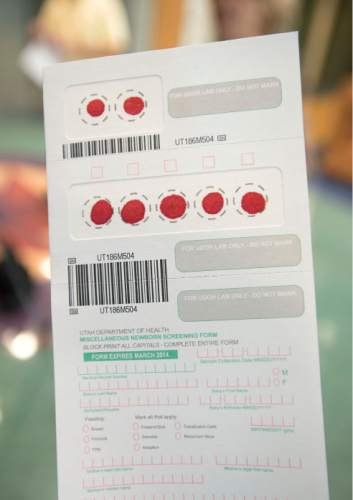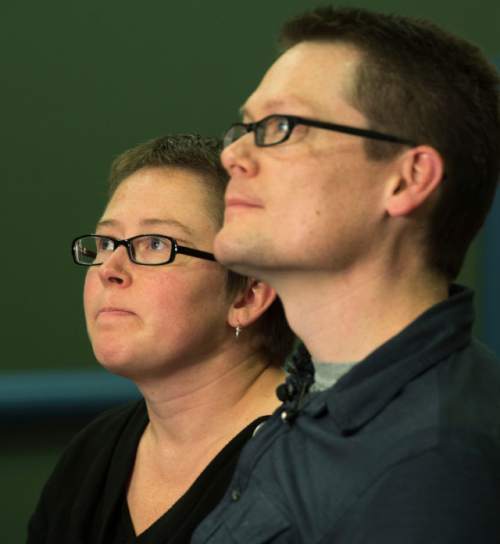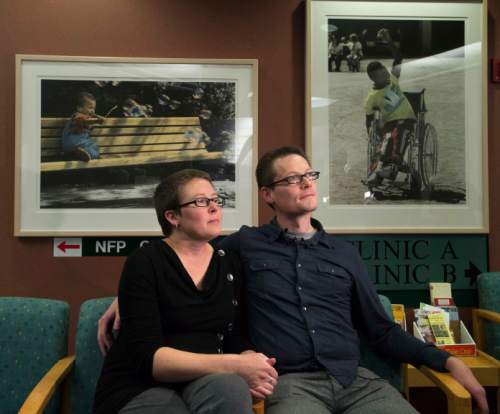Steve Griffin | The Salt Lake Tribune
A sample of the Utah Department of Health newborn screening form that tests the 53,000 b
Steve Griffin | The Salt Lake Tribune
Jody Bell and Logan Hauenstein talk to media members about their seven-week-old daughte
Steve Griffin | The Salt Lake Tribune
Jody Bell and Logan Hauenstein talk to media members about their seven-week-old daughte
Steve Griffin | The Salt Lake Tribune
A sample of the Utah Department of Health newborn screening form that tests the 53,000 babies born annually for 38 disorders. Jody Bell and Logan Hauenstein's seven-week-old daughter, Calla, was the first child in Utah to be diagnosed, using the screening, with SCID. Babies with SCID are not able to fight infections and often die. Calla was diagnosed very early and will soon have a bone marrow transplant that will increase her survival rate to over 95 percent. Currently, 23 states have adopted the T-cell receptor excision circle (TREC) assay as part of their routine newborn screening programs. Utah began screening for SCID on July 1, 2013 and has screened approximately 61,000 newborns for SCID to date. The prevalence of SCID was thought to be 1:100,000; however, through newborn screening, more children are being diagnosed and the prevalence appears to be closer to 1:50,000. Bell and Hauenstein were at the Department of Health CSCHN Building in Salt Lake City, Thursday, October 23, 2014, for a press conference.
Steve Griffin | The Salt Lake Tribune
Jody Bell and Logan Hauenstein talk to media members about their seven-week-old daughter, Calla, who was the first child in Utah to be diagnosed with SCID using the Utah Health Department's routine newborn screening test. Babies with SCID are not able to fight infections and often die. Calla was diagnosed very early and will soon have a bone marrow transplant that will increase her survival rate to over 95 percent. Currently, 23 states have adopted the T-cell receptor excision circle (TREC) assay as part of their routine newborn screening programs. Utah began screening for SCID on July 1, 2013 and has screened approximately 61,000 newborns for SCID to date. The prevalence of SCID was thought to be 1:100,000; however, through newborn screening, more children are being diagnosed and the prevalence appears to be closer to 1:50,000. Bell and Hauenstein were at the Department of Health CSCHN Building in Salt Lake City, Thursday, October 23, 2014, for a press conference.
Steve Griffin | The Salt Lake Tribune
Jody Bell and Logan Hauenstein talk to media members about their seven-week-old daughter, Calla, who was the first child in Utah to be diagnosed with SCID using the Utah Health Department's routine newborn screening test. Babies with SCID are not able to fight infections and often die. Calla was diagnosed very early and will soon have a bone marrow transplant that will increase her survival rate to over 95 percent. Currently, 23 states have adopted the T-cell receptor excision circle (TREC) assay as part of their routine newborn screening programs. Utah began screening for SCID on July 1, 2013 and has screened approximately 61,000 newborns for SCID to date. The prevalence of SCID was thought to be 1:100,000; however, through newborn screening, more children are being diagnosed and the prevalence appears to be closer to 1:50,000. Bell and Hauenstein were at the Department of Health CSCHN Building in Salt Lake City, Thursday, October 23, 2014, for a press conference.







